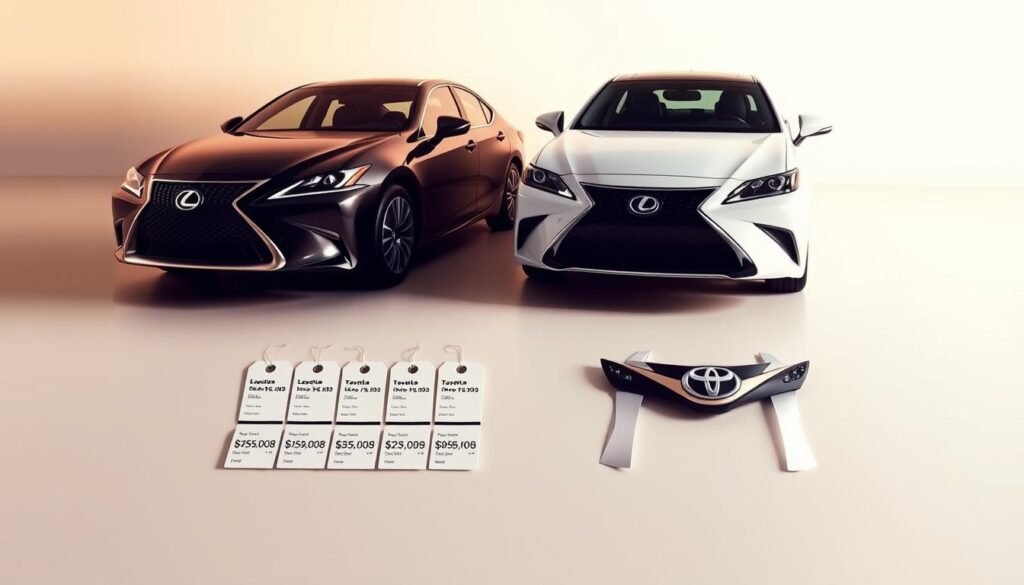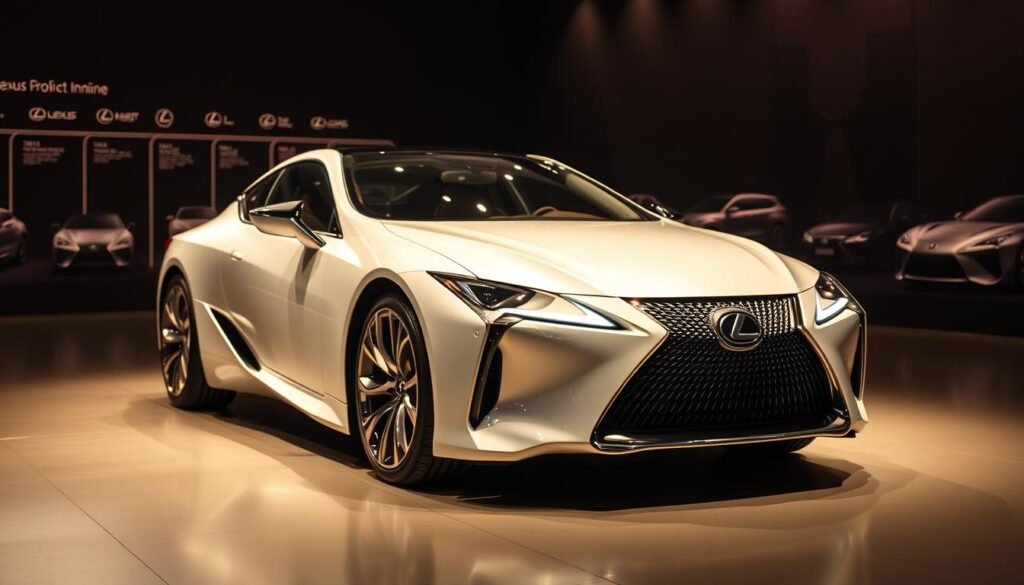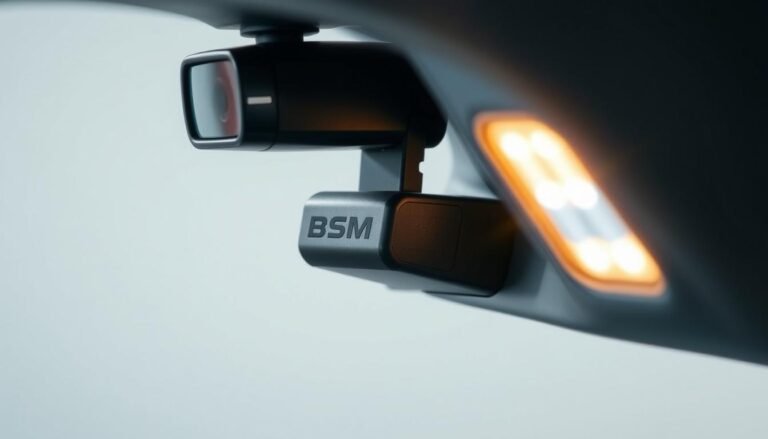Is Lexus and Toyota The Same? Explained Clearly
Is Lexus just another name for Toyota? Not exactly. Though both brands are from Toyota Motor Corporation, they serve different types of customers.
Lexus is Toyota’s luxury arm, created to offer high-end vehicles with top-quality features. This article breaks down how Lexus and Toyota are similar and how they’re not.
Lexus and Toyota cars do share many parts. But, Lexus goes all out on luxury, making comfy seats that heat up or cool down standard.
Toyota, on the other hand, makes cars that are easy on the wallet. They focus on being reliable and fitting what most people need in a day-to-day car.
Next, we’ll look at how fast they go, what tech they come with, and how they stand in the market. This deep dive will help you see what sets Lexus and Toyota apart.
Whether you love cars or are thinking of buying one, this comparison will guide you to the right choice.
Lexus and Toyota: An Overview
Lexus and Toyota’s relationship began in the late 1980s. Toyota wanted to enter the luxury vehicle market. So, they created Lexus, a brand for buyers wanting both luxury and reliability.
The Origins of Lexus
In 1989, Lexus was introduced with two cars, the LS 400 and ES 250. The LS 400 was a hit for its top-notch quality and performance. It helped Lexus make a big splash in the U.S.
By 1999, Lexus had sold one million vehicles. It reached ten million by 2019. Lexus stands out by combining luxury, performance, and advanced features, setting it apart from Toyota.
The Relationship Between The Two Brands
Lexus benefits from Toyota’s engineering expertise. It shares some parts with Toyota but aims for premium quality.
For instance, its designs focus on better engines and nicer interiors. The Lexus IS 300 is priced at $41,235, while Toyota’s top sedan is $39,235.
Lexus also emphasizes safety, featuring the Lexus Safety System+ 2.5 in all its cars. This shows its commitment to top-notch driver-assist tech.
What’s The Brand Difference?
Lexus and Toyota cater to different kinds of drivers. Lexus is all about luxury, featuring high-end materials, cutting-edge tech, and top-level comfort.
Toyota, however, focuses on making reliable and affordable cars that save on cost and fuel. This difference shapes both brands’ identities and how they market themselves.
Luxury vs. Economy Segment
Lexus aims at the luxury market, prioritizing comfort, advanced features, and a high-end driving experience. Take the Lexus UX 250h, for example.
It has a powerful 184 horsepower hybrid engine, blending luxury with performance. Toyota, in contrast, targets the economy market.
It focuses on affordability and quality. The Toyota Corolla Hybrid, with its 140-hp engine, is affordable and fuel-efficient.
Market Positioning
Lexus and Toyota target different customers with their pricing. Lexus vehicles, like the Lexus IS 300 which starts at around $41,235, are priced higher to reflect their luxury status. This pricing is above Toyota’s top models, emphasizing its luxury appeal.
Toyota markets to a broader audience by offering about 10 million vehicles a year. This strategy helps it reach those who need reliable yet affordable transport.
is lexus and toyota The same?
Lexus and Toyota are both owned by the Toyota Motor Corporation. However, they serve different markets.
Lexus is all about luxury, with teams dedicated to pushing the envelope in design. This structure lets Lexus innovate in high-end features while keeping Toyota’s trademark reliability.
Ownership and Corporate Structure
It’s key to know how Lexus fits into the Toyota family to really get their relationship. Started in 1989, Lexus became its own brand in 2005.
This move allowed Lexus to focus on luxury cars, with teams zeroing in on quality and cutting-edge features.
Shared Components but Different Focus
Even though they share parts, Lexus and Toyota chase different goals. For example, the Lexus ES and the Toyota Camry have similar engines.
But Lexus amps up the luxury with better materials and tech. Meanwhile, Toyota focuses on being practical and affordable. This shows how their paths diverge, despite starting from the same place.
Lexus vs. Toyota: Performance Metrics
When we talk about Lexus vs Toyota, performance is a key point for buyers. Lexus beats Toyota in speed and how smoothly they drive.
This is thanks to their stronger engines and better suspension. While Toyota aims at reliable and cost-effective rides, Lexus goes for top performance models. They aim to please those who want the best drive.
Acceleration and Handling
Lexus puts a lot of focus on quick starts and smooth driving. Take the Lexus NX 350h, with its 244 horsepower, compared to the Toyota RAV4’s 218.
This makes a big difference in speed and the joy of driving. Lexus cars also have advanced suspension. This makes them more stable and fun on curvy roads.
Engine Specifications and Diversity
Lexus has a variety of engines built for better performance. The Lexus RX 350, for example, has a strong 3.5L V6 engine with 295 HP.
This is more powerful than Toyota’s similar models. Lexus also offers hybrid models for those looking for power but with less environmental impact.
The ES 300h hybrid has 215 HP, slightly more than the Toyota Camry Hybrid. This shows Lexus is focused on better, diverse engines for a luxury experience.

Design and Aesthetics: Lexus vs. Toyota
Lexus and Toyota designs show clear differences because of who they want to attract. Lexus aims for luxury with high-end finishes, while Toyota opts for practicality and functionality. These choices highlight the distinct aesthetic paths each brand takes.
Interior Features and Comfort
Lexus is all about luxury inside, with top-notch materials and quiet surroundings. Passengers get to enjoy comfy leather seats and fancy design choices. Everything from the tech to the buttons is arranged for a luxurious feel.
Toyota, however, focuses on durable and user-friendly interiors. Their designs are modern but not as plush as Lexus, showing Toyota’s goal to be more affordable.
Exterior Design Philosophy
Lexus and Toyota also differ on the outside. Lexus cars have a bold look, like the signature spindle grille. They’re made to look sporty and perform well too.
Toyota’s design, though, puts practicality first. Their cars look current but are made to be reliable and easy for more people to love and use.
Lexus vs. Toyota: Technology Integration
When comparing Lexus and Toyota, we see key differences in their technology. Both brands excel in adding new tech to their vehicles.
Lexus has a focus on luxury and advanced technology, while Toyota aims for affordability. Knowing these differences is useful for making the right choice.
In-Vehicle Systems and Entertainment
In-vehicle systems for Lexus and Toyota have greatly improved. They’ve moved infotainment tech development to the U.S., boosting user experiences.
Now, drivers can wirelessly connect their phones with Android Auto and Apple CarPlay. This comes with touchscreen menus that are easy to use, ranging from 8 to 14 inches.
The Lexus NX introduced a new infotainment system. It replaced the old mouse pointer with touch and voice controls, making driving safer.
It stays updated with over-the-air updates and the User Profile feature. This lets drivers save their settings in the cloud and use them in any vehicle.
Safety Features and Innovations
For Lexus and Toyota, safety is key, and it shows in their car models. Lexus vehicles all have the Lexus Safety System+ 2.5, packed with features like Pre-Collision and Cruise Control.
Toyota offers similar safety tech, showing their dedication to keeping drivers and passengers safe. Both brands are working hard on safety.
Toyota’s Connected Technologies group drives this by aiming to unify the in-car tech experience. This team, of over 400 people, works tirelessly to integrate tech better.
| Feature | Lexus | Toyota |
|---|---|---|
| Infotainment System | Touch and voice controls with OTA updates | Available on higher trims, traditional system |
| Apple CarPlay/Android Auto | Standard in newer models | Available in updated systems |
| Safety Systems | Lexus Safety System+ 2.5 standard | Similar technologies available in most models |
| User Personalization | Cloud-based User Profile feature | Basic personalization features |

Lexus vs. Toyota: Comfort Levels
When you compare Lexus and Toyota, there’s a big difference in comfort. Lexus cars aim for luxury. They have top-notch materials and cool features to make rides better.
Expect things like heated seats and big spaces inside a Lexus. Toyota cars are more about saving money and being reliable. You would need to pick higher models to get those fancy extras.
Seating and Ride Quality
Lexus seats are made to be super comfy. They use nice materials like leather and add stylish wood trim. Lexus cars ride smoothly too, thanks to special suspensions.
This lets them handle different kinds of roads well. Toyotas are solid but don’t always have the same level of comfort. The type of Toyota you pick can change how comfortable it is.
Luxury Amenities Offered
Lexus cars have some awesome luxury bits as standard, like heated steering wheels and big infotainment systems. They even have tech to keep the inside quiet, so nothing bugs you while driving.
Toyota has good features too, but you often have to choose pricier versions to get them. For those who want the best in comfort and luxury, Lexus is the way to go.
Comparing Pricing Strategies
Lexus and Toyota have different approaches to setting prices. Lexus vehicles are in the luxury market, so they cost more.
This allows Lexus to provide a high-end experience focusing on quality, performance, and service.
Lexus Pricing vs. Toyota Affordability
Lexus models have higher prices because of their luxury label. For instance, the Lexus IS 300 starts at $41,235. This is $2,000 more than Toyota’s top sedan.
The higher price reflects Lexus’ commitment to advanced features and quality, like the Lexus Safety System+ 2.5 in all models.
Toyota, however, focuses on making cars more affordable. Take the 2024 Toyota RAV4, priced at $28,675, as an example.
It’s designed for people looking for good value while maintaining reliability and safety. Toyota aims to attract a wide range of buyers, securing a spot in the economy and mid-range market.
Value Proposition in Each Segment
Lexus and Toyota cater to different customers. Lexus offers a wide range of sports cars with impressive performance.
The 2024 Lexus RX Hybrid, for instance, has up to 366 HP and can go from 0-60 MPH in under 6 seconds. This strategy appeals to those who want luxury and speed.
Toyota focuses on reliability and functionality, reaching a broader audience. Its cars have features similar to Lexus’, but usually in higher trims.
Lexus’s approach of including premium features as standard enhances its appeal, despite higher prices. It ensures customers get both quality and a great driving experience.
| Model | Starting Price | Horsepower | 0-60 MPH Acceleration |
|---|---|---|---|
| 2024 Lexus RX Hybrid | $49,950 | 246-366 HP | 7.4-5.9 seconds |
| 2024 Toyota RAV4 Hybrid | $28,675 | 219-302 HP | 7.8-5.5 seconds |

Lexus vs. Toyota: Reliability Ratings
In the debate over Lexus and Toyota’s reliability, both brands stand out. They show their strength in lasting quality and performance.
Consumer Reports has noted that Lexus and Toyota both enjoy high reliability ratings. This is thanks to the strict quality measures of their parent company.
Lexus usually scores a bit higher, thanks to its premium build and detailed craftsmanship.
Consumer Reports and Reliability Metrics
According to the newest Consumer Reports rankings, Lexus leads with a score showing only 135 problems per 100 vehicles. This makes it the top reliable brand out there.
Toyota isn’t far behind, with a score of 144 problems per 100 vehicles. This is the best among regular car brands. Models like the Lexus IS and Toyota Camry are praised for having few issues.
- Lexus IS: 135 PP100
- Lexus ES: 135 PP100
- Lexus NX: 135 PP100
- Lexus RX: 135 PP100
- Toyota 4Runner: 144 PP100
- Toyota Camry: 144 PP100
- Toyota Corolla: 144 PP100
Maintenance Costs and Frequency
Maintenance costs are vital when owning a car. Lexus owners may pay more due to luxury parts and specialized service. Yet, many think this extra cost is worth it for better service.
Overall, shared parts between Lexus and Toyota help keep long-term costs lower than other luxury vehicles.
Things that affect maintenance costs are:
- Availability of parts: Lexus parts can cost more but are often available from Toyota.
- Service frequency: Both brands need regular check-ups, though Lexus might need more detailed care.
- Overall reliability: High reliability means less need for repairs over time.
Choosing Lexus or Toyota means picking cars known for lasting and costing less over time.
Market Impact and Historical Significance
Lexus has changed the luxury vehicle market since the late 1980s. Its launch reshaped what customers expect from luxury cars in terms of reliability, performance, and service.
Lexus competes with giants like BMW and Mercedes-Benz. It shows its historical significance in changing the luxury car market.
The Evolution of Lexus in The Luxury Car Market
In 1989, Lexus entered the luxury market with the LS 400. This showed Toyota’s big ambitions and set new standards for quality. The introduction of the RX 400h, a luxury hybrid SUV, showed Lexus’s innovative spirit.
This move helped Lexus grow and pushed the whole luxury segment forward. The brand now is Japan’s top premium car seller and is recognized worldwide.
How Toyota’s Legacy Influences Lexus?
Toyota’s focus on quality and innovation greatly benefits Lexus. Thanks to Toyota, Lexus leads in luxury vehicles.
With rising sales and market share, Lexus uses Toyota’s strong manufacturing and supply chain. This ensures every Lexus car meets high standards, often exceeding customer expectations.

Recent Trends in Lexus and Toyota
Lexus and Toyota are keeping up with what customers want today. They are focusing on being more eco-friendly.
This means making more hybrid cars that are good for the planet. Both brands are working hard to make cars that are better for the environment but still fun to drive.
Shifts in Consumer Preferences
People are now more interested in cars that don’t harm the environment. Toyota is well-known for its hybrid cars, like the Prius.
Lexus is also making waves in the luxury car market with its new Lexus LX 700h. This car has a great hybrid system that makes it both powerful and green.
The Move Towards Hybrid and Electric Vehicles
Toyota and Lexus are not just focusing on hybrids; they’re also looking at electric cars. Toyota plans to bring out six electric car models by 2026.
Lexus wants all its cars to be electric by 2035, with models like the LF-ZC and LF-ZL leading the charge.
These cars will have advanced batteries and cool designs. They show how luxury and caring for the planet can go hand in hand.
Conclusion
In closing, it’s clear that Lexus and Toyota serve different customers. Though both are part of Toyota Motor Corporation, Lexus is all about luxury and high-tech features since its start in 1989.
Toyota focuses on being affordable and reliable, making it a top choice worldwide. Lexus cars cost more because they use top-quality materials and have fancy features.
For instance, they come with the Mark Levinson sound system and Lexus Safety System +. This shows Lexus’s aim to offer a top-notch driving experience.
On the flip side, Toyota offers a wide range of cars, from small ones to big SUVs. This means there’s a Toyota for everyone. They also have great service after you buy the car.
In the end, understanding the differences between Lexus and Toyota matters a lot when buying a car. If you want luxury and top service, Lexus might be your pick.
If you’re looking for something more budget-friendly and reliable, Toyota could be the better choice. What matters most is what you value in a car.
FAQs
Is Lexus and Toyota the same company?
No, Lexus and Toyota are two separate brands. They both come under Toyota Motor Corporation. Lexus is the luxury arm of Toyota, aiming at a different group of customers.
What are the main differences between Lexus and Toyota?
The brands differ in who they target, how they price their cars, their design ideas, and how their cars perform. Lexus is all about luxury and high-tech features. Meanwhile, Toyota focuses on being affordable and dependable.
How do Lexus and Toyota compare in terms of reliability?
Lexus and Toyota are both known for lasting a long time. Lexus usually gets slightly better scores for being a bit more upscale. But, fixing a Lexus tends to cost more than fixing a Toyota.
What are the shared components between Lexus and Toyota?
Lexus and Toyota share lots of parts and engineering. Yet, Lexus goes for a fancier approach with top-notch materials and more sophisticated features. This makes Lexus stand out as more luxurious.
How do the performance metrics of Lexus and Toyota differ?
Lexus cars usually drive better, with faster engines and better handling, because of stronger engines and improved suspension. Toyota, however, has options that are more about practical performance.
Are the design and comfort levels different between Lexus and Toyota?
Yes, Lexus aims for luxury, offering plush materials and roomy interiors. Toyota cars are more about being functional. They provide enough comfort, especially in the base models.
What technology features are available in Lexus compared to Toyota?
Lexus often includes the newest tech features as standard, like fancy entertainment systems and high-quality audio. Toyota tends to add these high-tech options to its more expensive versions.
How is pricing different between Lexus and Toyota?
Lexus cars usually cost more because they’re seen as more luxurious and come with more extras. Toyota makes its cars with an eye on keeping prices down. This way, more people can afford them.







